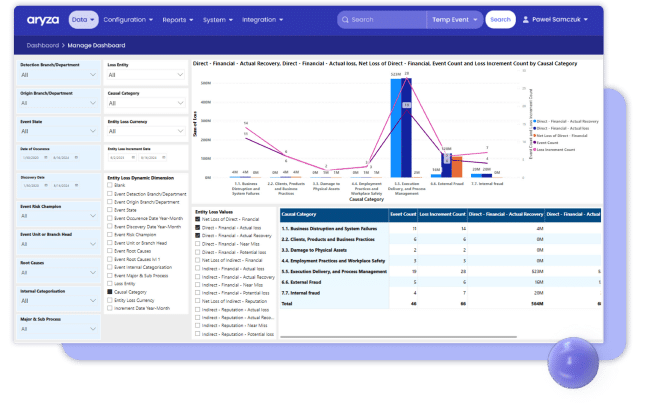Operational Resilience: Build Resilience That Lasts
Operational resilience is more than recovery—it’s about readiness. By connecting risk, control, and business service data, organisations can make faster, better decisions in times of disruption, ensure compliance, and strengthen long-term stability.

Improve operational resilience
For financial services firms, operational resilience is the ability to prevent, adapt, respond to, recover and learn from operational disruptions. Looked at another way, operational resilience is an outcome that a firm’s risk and control framework leads to. Aryza Unite’s connected approach to operational resilience enables firms to engage with the information needed to make the right decisions, to stay compliant and meet the business’s strategic goals in the face of a crisis.
Centralise Business Services
Maintain a business services library – Build and manage a single source of truth about the organisation’s business services.
Define Impact Tolerances
Create impact tolerances – Use assessments to identify and understand potential impacts on business services with a range of criteria.
Link Risks to Services
Connect risks and controls – Link risks and controls to the risk appetite, to related business services, and to resources necessary to deliver those services.
Monitor Service Disruption
Track impacts on business services – Build key indicators that can automatically flag the crossing of an impact tolerance thresholds, based on API data feeds.
Report Resilience Insights
Share operational resilience insights – Through powerful, integrated BI reporting, provide the business, the board, and regulators with the operational resilience intelligence they need.
Run Scenario Testing
Support scenario analysis – Capture important information that can be used to create and test operational resilience scenarios.
Take Action and Improve
Manage actions and learn lessons – Automate key actions, engage with impact event management, and access this rich information archive to learn lessons.
Foster strength and agility
Today, the importance of a robust approach to operational resilience for financial services firms can be in no doubt. Aryza Unite – Operational Resilience enables organisations to connect their programmes directly to their operational risk, enterprise risk, and other GRC information. Data, actions and outcomes are understood in the context of the firm’s overall risk appetite and strategic goals. This enables faster decision-making in times of crisis, stronger resiliency, and ongoing regulatory compliance.

Case: Leading UK Based Investment Manager
Case: Leading Global Financial Services Firm
Case: Major Global Banking Institution
A leading UK based Investment Manager with over £22Bn in funds under management implemented Aryza Unite and migrated from another GRC supplier. The migration was carried out seamlessly with minimal to zero disruption.
The firm is using the Aryza Unite widely within the organisation and utilise the functionality for a large number of GRC activities.
These include:
- Reporting and escalation of dealing errors using the Incident Management functionality
- Compliance Monitoring
- Compliance Thematic Reviews
- Compliance Breaches
- Internal Audit Reporting
- Regulatory Horizon Scanning
- Policy Exception
- Product and Service Reviews
- Third Party SLA Breaches
- Data Breach Analysis and Escalation
- Risk and Control Testing
This deployment demonstrates the wide potential of Aryza Unite to provide significant value across a wide spectrum of GRC activities and showcases the deep functionality and flexibility inherent in the system.
Despite the challenges of a rapidly changing regulatory environment, a leading global financial services firm has successfully implemented Aryza Unite, migrating from their legacy GRC system.
The firm identified a clear opportunity to enhance their GRC processes to meet more stringent regulatory requirements while improving operational efficiency. The Aryza system and team were chosen as they wanted to implement a market-leading and dynamic platform supporting a diverse range of GRC activities including incident management, risk and control assessments, key risk indicators, compliance and policy management.
The system needed to deliver more efficient risk management with effective and consistent risk assessment and reporting capabilities to support the firm’s operations across multiple jurisdictions. Utilizing its experienced team of GRC experts, coupled with its unique mix of modern, adaptable software, Aryza delivered a phased approach to implementing an enterprise-wide solution that automated processes, eliminated silos, and improved ease of use and efficiency.
The platform has led to significant improvements in incident management, risk assessment quality, and reporting capabilities, enabling the firm to respond more effectively to regulatory requirements
A major global banking institution with operations in over 30 countries implemented Aryza Unite to standardize their risk management approach across all regions. The company needed a solution that could accommodate varying regulatory requirements while providing consolidated group-level reporting.
The initial scope of the project was to implement the Risk and Control Assessment (RACA) module to create consistency in how operational risks were assessed across the organization. We delivered a configurable RACA process that allowed for local customization while maintaining group-wide standards. The system’s flexibility enabled the company to apply different risk assessment matrices for different business units while rolling up to consistent group reporting.
Following the successful implementation of the RACA module, the company expanded the implementation to include incident management, key risk indicators, and action tracking. The integrated nature of our solution allowed for automatic linkage between incidents, risks, and controls, providing a comprehensive view of the risk landscape.
The incident management functionality was particularly impactful as the wide and diverse nature of the group meant that reporting of incidents was unstructured and difficult to quantify and track.
The implemented system was transformational and enabled a centralised view of incidents, with rapid response times and features such as root cause analysis and automated action plans
Contact us
"*" indicates required fields






